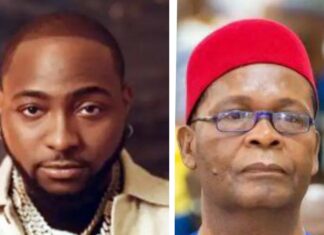By Tony Eluemunor
Suddenly, things seem to be turning around for former Delta State Governor, James Ibori.
There is a frenzy of writing on Facebook about his date of release from prison in London. Some of the postings say he has already been released and will be in Nigeria as soon as he could possibly get a seat on a flight.
To those who post such, I have little to say.
So, this article is not addressed to them, but to those who are doing their malicious best to destroy whatever ray of positive light, from the Ibori point of view, that has been trained recently on this case.
One such person approached me a few weeks ago to ask where Ibori got the money with which he bought a private jet. When I told him that Ibori never bought a private jet, he began to stutter.
From there he asked if it was not true that Ibori got some oil majors to launder money for him.
When I reminded him that Ibori never faced such a charge, and that such nonsense only appeared in a newspaper allegation that Nuhu Ribadu made, and that such a question has given his revisionist source away, he left after promising to call me for further questioning.
This man, who came all the way from the United States and who claimed he was researching a book, has not called.
Yet, why such revisionist efforts? Suddenly, the hunters are becoming the hunted as the British police investigators and prosecution officials arrayed against Ibori have been indicted and dropped from the case.
The recent court sessions on the case came at Ibori’s behest.
Now, his legal team may ask that his conviction be quashed – as a lawyer, Stephen Kimlish, advised in an interview on Ben TV in Lagos, rebroadcast by AIT.
He said: “Well, the fact is that most times, people plead guilty for the wrong reasons. It does happen.
“In my career I have seen people plead guilty because of wrong advice or when the evidence seems too strong or when they have lost hope, and sometimes they don’t have the will-power to stand long trial or their barrister might say you will get a much lower sentence if you plead guilty.
“So I can’t say in particular why James Ibori pleaded guilty and whether he is guilty or not guilty, but what I can say is that when there is corruption on this scale and in the background of the case – I’m involved in this case – the British law says that even if you pleaded guilty or not, your guilty plea can be quashed because the British public can’t discountenance such major corruption in a common investigation.
“Therefore, whether you plead guilty or you plead not guilty, your conviction can be quashed. So, in this case, that is what we are currently aiming for. As for Bhadresh Gohil, I am going for quashing.”
One of the media bashings Ibori suffered from is this example from Olusegun Adeniyi implying in a newspaper article of September 20, 2012 that Ibori had no other source of income while he was governor.
Relying on the 44-page paper filed by the London Metropolitan Police against Ibori in court, I’ll prove that Adeniyi and others lied.
The paper bore a simple title: “R versus James Ibori. Opening Note For Sentence”.
First item: It proclaimed that Ibori was the governor of Delta State, one of the richest oil producing states in Nigeria.
Second item: “He deliberately and systematically defrauded the people whose interests he had been elected to represent”.
Third item: “The total sum that Ibori has stolen remains unquantified. However, the sums that formed the subject of the two indictments to which Ibori has pleaded guilty amount to approximately fifty million pounds”.
Yet, most news organisations said Ibori had pleaded guilty to stealing 350 million pounds.
The Guardian of London, which reported the 50 pounds sum, added that Ibori “amassed a portfolio of six properties outside Nigeria worth £6.9m at a time he was being paid £4,000 a year as state governor of the Delta region.
“The properties in London included a flat in St John’s Wood, a house in Hampstead, and one in Regent’s Park.
“He also had a £3m mansion in South Africa and properties in Texas and in Dorset, near to where his children attended private school.
“Ibori also bought a fleet of luxury cars, and in three years ran up £920,000 on his American Express Centurion card – a card only available to the super-rich, Wass told the court.
“In 2005, Ibori instructed a London solicitor to buy a private jet costing $20m”.
Now, on whether Ibori had other sources of income, let us jump to page 14 of that same document dealing with MER Engineering.
Item 81: “MER was a company that was incorporated in Nigeria in 1990. It built houseboats, which were rented out to oil workers in the Delta.
“It was Ibori who was able to influence the contracts with Chevron and Shell and the NNPC [Nigerian National Petroleum Corporation].”
Item 83: “It was MER money that paid for the Ibori property in Hampstead, Westover Hill.”
Count 5. Item 84: “It was MER money that paid for the house Ibori bought in Houston Texas.
Item 85: “It was MER money that paid for the deposit for the $20 million Challenger Jet airplane that Ibori was in the process of buying when his monies were restrained by the UK courts”.
Weeks before Ibori was sentenced, the Economic and Financial Crimes Commission (EFCC) arrested and questioned one Babalakin on the charge that he helped Ibori launder money, using the account of Babalakin’s company.
The EFCC said Ibori never tried to buy a jet but was only helped to launder money by pretending he was buying a jet.
The EFCC was lying because it had known for years that Ibori actually invested some money in a registered air charter company for a jet that would be used commercially, but the world has been deceived that Ibori had bought, or was in the process of buying, a private jet.
The aircraft investment made with MER Engineering funds appeared in The Guardian of London and other papers, thus: “In 2005, Ibori instructed a London solicitor to buy a private jet costing $20m”.
Now, which private jet was London Metropolitan Police talking about? Or did the EFCC not arrest Babalakin on the allegation that he helped Ibori launder money in the guise of buying a private jet?
And didn’t the same London Met Police state in court that Ibori had invested only $4 million in that aircraft – money from MER Engineering?
Adding the $4 million for the jet to the $6 million for the properties – sums that came from MER Engineering – brings the entire sum to $10 million.
If you make allowance for police exaggeration of property costs, you would have a sum below $8 million.
It is a huge amount but it is nowhere near 50 or 250 million pounds. And the monies came from MER Engineering accounts.
Also, I don’t want to go into the amount of the travel and overnight allowances that Ibori was paid during his eight-year tenure as governor.
In fact, I once reminded Olusegun Adeniyi that he collected allowances for trips with the late President Umaru Yar’Adua and especially for that 2010 South African World Cup jamboree which he, among a “lean” retinue of 500 officials attended, costing Nigeria N314,473,438.22.
Was the allowance for that trip part of his annual salary?
Sometimes I am tempted to disbelieve my eyes.
Item 175 of the same court document said: “By the time he was into his second term of office as Governor of Delta State, James Ibori had defrauded Delta State of such large sums of money that he was planning to buy himself a private jet aeroplane costing $20 million.”
Is this not the same plane for which Babalakin was arrested, and the EFCC said he was laundering money for Ibori in the guise of buying a plane?
Item 183: “MER had an account at Barclays Bank in Knightsbridge. The money went from the oil companies straight out of Nigeria and into MER account in Barclays”. And that too is a crime?
Item 29: “Ibori used money defrauded from the people of Nigeria to buy a property in Houston in Texas …” only to see in Item 84 that “it was MER money that paid for the house Ibori bought in Houston Texas.”
Ibori’s many sins for which he was convicted included this one in item 34: “In addition to his millionaire life style, Ibori called himself ‘HIS EXCELLENCY’, a title not recognised by the Constitution”.
Also, Ribadu (former EFCC chairman) accused the oil majors of helping Ibori launder money over the same MER Engineering contracts, claiming that the company had no contracts at all with those oil companies.
And such nonsense even found its way into the Financial Times of London in September 2007 and Sahara Reporters even published a story headlined “How Ibori Bought A Private Jet”.
Really, truth has been eclipsed in the Ibori media-lynching bid.
I wonder how the influential Financial Times will now view its “Probe into Chevron and Shell payments” story written by Michael Peel and Dino Mahtani: “A UK court affidavit seen by the Financial Times says there is reasonable cause to believe Ibori bled money from his oil-rich state and bought assets including a $20m jet”.
Now that the whole world knows the so-called “reasonable cause to believe that ….” was actually unreasonable, and Ibori bought no private jet, how would it view any words that fell off the lips of Ribadu?
Media manipulation was in full sail! Many journalists and media houses – and the public too – fell for it.
• Eluemunor is Ibori’s media assistant.













